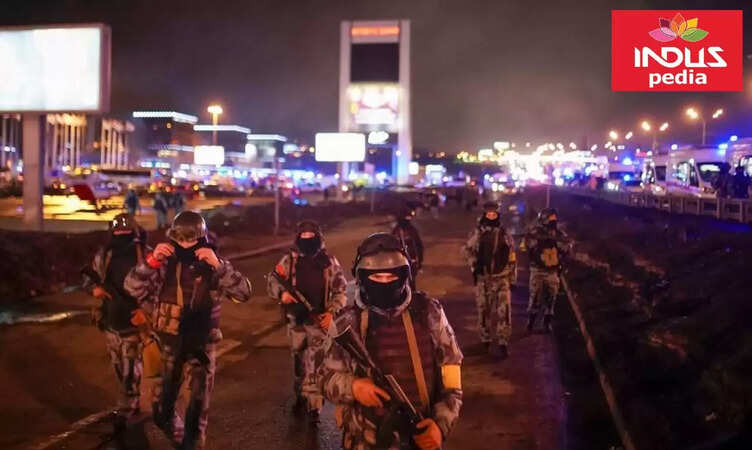Decoding the Moscow Terror Attack: Unraveling Conflicting Narratives

Moscow. It is premature to exonerate or blame Ukraine and the Western agencies of having masterminded the terror attack in Moscow. The horrific terror attack on the Crocus City Hall, Moscow in March 2024, which killed at least 144 innocent people and injured more than 300 others, deserves global condemnation.
This has been the largest terror attack inside Russia in the last two decades, which once again reminds us of the growing danger of terrorism, the vulnerability of civil society and the inadequacy of a synergised global response to tackle it.
Terrorism must be condemned in all forms and manifestations anywhere in the world. Four terrorists of Tajikistan origin, who executed it are in custody along with other suspects/collaborators undergoing investigations and trials. All terrorists are Tajiks claiming to have done it for money.
The attack seems to have been executed by Islamic radicals, which could be a possible “paid to kill operation”. In context of the ongoing Russia-Ukraine War and the intense information warfare campaign between the US-led NATO, Ukraine and Russia, conflicting narratives are emerging, which are worth decoding, along with their implications and the way ahead.
WHAT IS U.S.-LED WEST PROPAGATING?
The US-led NATO, which is fighting a non-kinetic war (in information, economic, political and diplomatic domains) against Russia will like the world to believe that this terror attack has been done by the Islamic State (Khorasan Province), ISIS(KP) to punish Russia.
It is highlighting the failure of the Russian intelligence as well as the security system. It is vigorously attempting to exonerate Ukraine from any allegation of any link with this terror attack. The US is also indicating the complacency of Russian leadership towards its claim of having provided on 7 March 2024, an intelligence warning given to Russians regarding a possible terror attack on a public gathering.
RUSSIAN NARRATIVE
Russia would like to believe that the Moscow terror attack is an extension of Russia-Ukraine War. While it agrees that Islamic radicals have executed it, but it will like to believe that in context of the ongoing war with Ukraine, hostile powers like Ukraine could have masterminded the “paid to kill operation” through ISIS(KP) cadres.
Russia believes that Ukrainian nationalists have paid in cash and cryptocurrency to the perpetuators of the attack. It also indicates that the terrorists were trying to flee to Ukraine and alleges that some window was open for them to get into hostile territory.
The Russian Investigative Committee has claimed that it has evidence connecting Ukraine to the Crocus City Hall terrorist attack. Russia has asked Ukraine to immediately arrest and extradite all connected to terror attacks in Moscow and Kerch Bridge to Russia, including their SBU Security Service Chief.
Russia’s continued efforts to link Ukraine and the West to the terrorist attacks is being seen as ploy to generate more domestic support for its war in Ukraine, by the West. The attempt of the terrorists to flee into hostile territory, as claimed by Moscow, can also be construed as a natural reaction of any terrorist for his safe exit, whether Ukraine was involved in it or otherwise.
VALIDITY OF ISIS (KP) CLAIMS
The jihadist group ISIS(KP) has claimed through a released video footage that it was behind the Moscow attack and BBC claims to have verified the video footage. ISIS(KP) narrative of punishing Moscow for intervention in Afghanistan, Chechnya, Syria is marred with absence of any immediate trigger.
In fact in the last few years, the US has killed more ISIS commanders than Russia; hence the terror group choosing Russia as a target over Western destinations or Israel, working in favour of the US is surprising, unless it’s backed by some lucrative deal.
Russia admits that the terror attack was committed by Islamic radicals from Tajikistan, but maintains the possibility of interested parties or agencies ordering it through them in “paid to kill operations” as ISIS, as well as the terrorists involved were amenable to financial allurement.
TAJIKISTAN AND TURKEY CONNECTIONS
Tajik President Rahmon has condemned the Crocus City Hall attack as a shameful and terrible event,. He seems concerned with extremism in many areas of Tajikistan. At least nine people have been arrested last week by Tajik authorities, for alleged links to the Moscow attack suspects.
Faridun Shamsiddin was one of the main attackers from Loyob, Tajikistan. Nine of the Tajik suspects are residents of Vakhdat, a town east of Dushanbe that is home to the second alleged attacker, Saidakram Rajabalizoda. It is learnt that both of them met in Turkey in early March to allegedly hatch the plot.
Turkey is not only a convenient country for any migrant worker to renew a Russian permit, but with its radicalised credentials under President Erdogan, is also seen as a place where IS(KP) can recruit militants. Turkey has become a logistical hub for ISIS, because both Tajiks and Russians can travel there without a visa, hence an ideal staging area for terror attack in Russia.
UKRAINIAN NARRATIVE
The Ukrainian narrative to suggest that it could be a false flag operation by the Russians to be used as an excuse for escalation of the Russia-Ukraine War is less likely, because Russia is already at war with Ukraine and does not need any additional excuse to escalate at any point of its choosing.
Moreover, ensuring internal security has been a trademark of President Putin, and he will not like to risk his reputation of strong security provider. Ukraine’s false flag claim, therefore, appears as absurd as much as Ukraine accusing that Russia blew its own Nord Stream pipeline and its own bridge to Crimea.
PROGNOSIS
The narrative of ISIS (KP) is supported by arguments of it taking responsibilities for it through the release of a video of the site and the presence of a large number of Tajik cadres in it. A fair amount of Tajik population is present in Moscow, which could have been lured to collaborate to make such a difficult mission easy.
The intelligence failure of the Russian agencies and complacency of its internal security organisations would have added to the vulnerability of Moscow to such an attack. ISIS(KP) is also wanting to increase its influence, and an attack of this kind could boost its image amidst Islamic radicals to draw more support and finances.
The ISIS(KP) narrative has some glaring loopholes. In case it wanted to punish Moscow for intervention in Afghanistan, Chechnya and Syria, as is being propagated in the media, then all these interventions happened long back and there was no worthwhile immediate trigger available to justify such a massive attack.
Moreover, an attack of this magnitude was difficult, given the current capability of ISIS(KP) in a strictly controlled area of Moscow. This does not rule out any outside country planning and conducting the attack through ISIS(KP) cadres in exchange of handsome payment as the terror organisation is also in dire need of financial resources.
The most important argument which goes in favour of possible Ukrainian or Western link is that an attack of this kind can divert the attention of Russia from Ukrainian conflict towards ISIS(KP) which is beneficial for Ukraine or the US-led NATO. Moreover if Al-Qaeda can be supported and funded by the US to checkmate the USSR in the past, there is no reason why ISIS(KP) cannot be lured to change the course of the Russia-Ukraine war by diverting Russian attention towards it through such an attack.
It will therefore be premature to exonerate or blame Ukraine and Western agencies of having masterminded such a terror attack in Moscow, to divert Russian focus from Ukraine or accept/reject ISIS(KP) claim of having conducted it all by itself.
The attack has been carried out by Tajik terrorists but Tajikistan has condemned it and is cooperating in investigation; hence, it makes no sense for Russia to punish Tajikistan or divert resources to keep hunting ISIS(KP) cadres in Afghanistan or Syria.
However, Russia will certainly be mindful of the ISIS(KP) threat and work out long term internal and external security strategy to tackle the same. For Russia, blaming Ukraine and taking it as part of ongoing war is a lesser embarrassment than conceding an ISIS(KP) attack on itself.
It appears that Russia would continue with its full focus on the Russia-Ukraine war and will not get diverted towards attacking ISIS(KP). It will continue to propagate the Ukrainian link so that Russians can convince the domestic audience that it is part of their existential war against the West and it cannot afford to give a window of opportunity to Ukraine or US led NATO.
